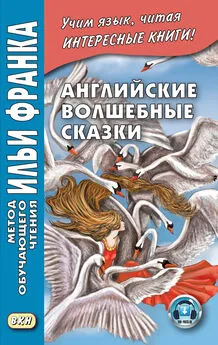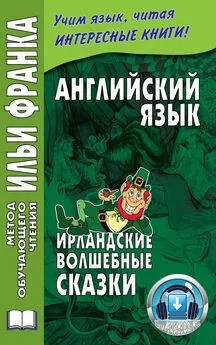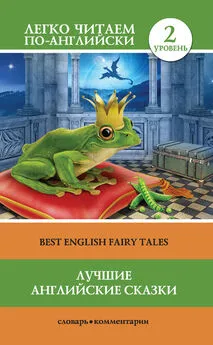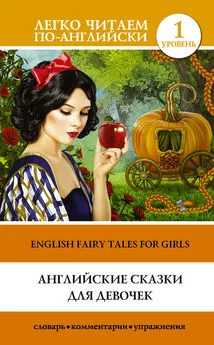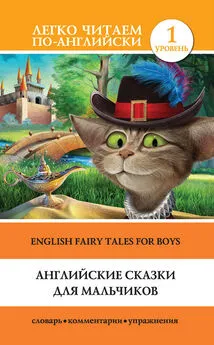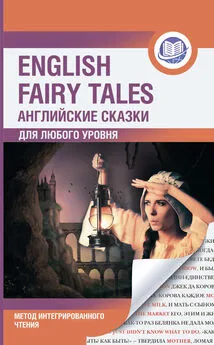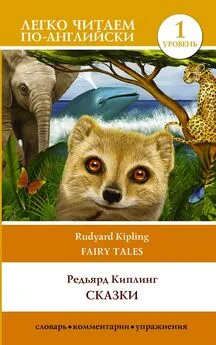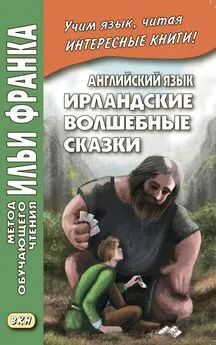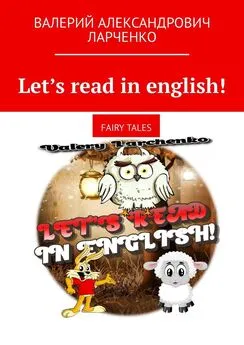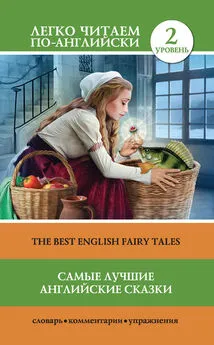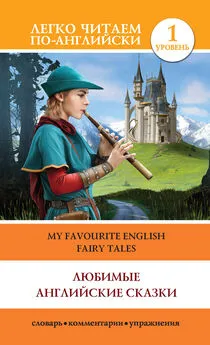Джозеф Джейкобс - Английские волшебные сказки / English Fairy Tales
- Название:Английские волшебные сказки / English Fairy Tales
- Автор:
- Жанр:
- Издательство:неизвестно
- Год:2020
- Город:Москва
- ISBN:978-5-7873-1325-3
- Рейтинг:
- Избранное:Добавить в избранное
-
Отзывы:
-
Ваша оценка:
Джозеф Джейкобс - Английские волшебные сказки / English Fairy Tales краткое содержание
Пособие способствует эффективному освоению языка, может служить дополнением к учебной программе.
РЕКОМЕНДОВАНО для «нулевого» и начального этапов обучения английскому языку.
В формате PDF A4 сохранен издательский макет.
Английские волшебные сказки / English Fairy Tales - читать онлайн бесплатно ознакомительный отрывок
Интервал:
Закладка:
‘Well, there(ну: «ну там») ,’ says she, ‘I should ha’ liked to ha’ seen her(я хотела бы увидеть ее = жаль, что я ее не видела) .’
‘Well,’ says they(говорят они; says во множ. числе – разг. вместо say ) , ‘there’s a dance again this evening(будет бал снова этим вечером) , and you must go with us(и ты должна пойти с нами) , for she’s sure to be there(ибо она точно будет там) .’
reckon[‘rekən]The master’s son had been reckoning on seeing her, and he danced with no one else, and never took his eyes off her. But, before the dance was over, she slipt off, and home she went, and when the maids came back she pretended to be asleep with her cap o’ rushes on.
Next day they said to her again, ‘Well, Cap o’ Rushes, you should ha’ been there to see the lady. There she was again, gay and ga’, and the young master he never took his eyes off her.’
‘Well, there,’ says she, ‘I should ha’ liked to ha’ seen her.’
‘Well,’ says they, ‘there’s a dance again this evening, and you must go with us, for she’s sure to be there.’
Well, come this evening(когда пришел этот вечер) , Cap o’ Rushes said she was too tired to go(сказала, что она была слишком усталой, чтобы пойти) , and do what they would(и что бы они ни делали = пусть делают, что хотят) she stayed at home(она осталась дома = а она останется дома) . But when they were gone(но когда они ушли) , she offed with her cap o’ rushes and cleaned herself(она сняла свой камышовый чепец и почистила себя) , and away she went to the dance(и отправилась на бал).
The master’s son was rarely glad when he saw her(сын хозяина был на редкость: «редко» рад, когда он увидел ее) . He danced with none but her(он не танцевал ни с кем, кроме нее) and never took his eyes off her(и вовсе не сводил своих глаз с нее) . When she wouldn’t tell him her name(когда она не захотела сказать ему свое имя) , nor where she came from(ни откуда она пришла) , he gave her a ring(он дал ей кольцо) and told her if he didn’t see her again(и сказал ей, что если он не увидит ее снова) he should die(он умрет).
Well, before the dance was over(прежде чем бал был окончен) , off she slipped(прочь она ускользнула) , and home she went(и домой она пошла) , and when the maids came home(и когда служанки пришли домой) she was pretending to be asleep with her cap o’ rushes on(она притворялась быть спящей = что спит в своем камышовом чепце).
herself[hǝ’self] , rarely[‘reǝlɪ]Well, come this evening, Cap o’ Rushes said she was too tired to go, and do what they would she stayed at home. But when they were gone, she offed with her cap o’ rushes and cleaned herself, and away she went to the dance.
The master’s son was rarely glad when he saw her. He danced with none but her and never took his eyes off her. When she wouldn’t tell him her name, nor where she came from, he gave her a ring and told her if he didn’t see her again he should die.
Well, before the dance was over, off she slipped, and home she went, and when the maids came home she was pretending to be asleep with her cap o’ rushes on.
Well, next day they says to her(на следующий день они говорят ей), ‘There(вот: «там») , Cap o’ Rushes, you didn’t come last night(ты не пришла прошлой: «последней» ночью) , and now you won’t see the lady(и теперь ты не увидишь эту даму) , for there’s no more dances(ибо нет больше танцев) .’
‘Well, I should have rarely liked to have seen her(я бы исключительно: «редко» хотела увидеть ее) ,’ says she.
The master’s son tried every way(сын хозяина пробовал каждый способ: «путь») to find out(обнаружить) where the lady was gone(куда дама ушла) , but go where he might(но куда бы он ни ходил) , and ask whom he might(и кого он ни спрашивал) he never heard anything about her(он так и не: «никогда не» услышал что-то о ней) . And he got worse and worse for the love of her(и ему становилось все хуже и хуже из-за любви к ней) till he had to keep his bed(пока он не должен был оставаться в постели).
‘Make some gruel for the young master(сделай немного каши для молодого хозяина) ,’ they said to the cook(сказали кухарке) . ‘He’s dying for the love of the lady(он умирает от любви к той даме) .’ The cook set about making it(кухарка начала делать ее; to set about – приступать ) when Cap o’ Rushes came in(когда Камышовый чепец вошла внутрь).
‘What are you a-doing(что ты делаешь; разг. вместо doing ) ?’ says she.
‘I’m going to make some gruel(я собираюсь сделать немного каши; to be going to do something – собираться сделать что-то ) for the young master(для молодого хозяина) ,’ says the cook(говорит кухарка) , ‘for he’s dying for the love of the lady(ибо он умирает от любви к той даме) .’
‘Let me make it(позволь мне сделать ее) ,’ says Cap o’ Rushes.
might[maɪt] , gruel[‘ɡru:əl]Well, next day they says to her, ‘There, Cap o’ Rushes, you didn’t come last night, and now you won’t see the lady, for there’s no more dances.’
‘Well, I should have rarely liked to have seen her,’ says she.
The master’s son tried every way to find out where the lady was gone, but go where he might, and ask whom he might he never heard anything about her. And he got worse and worse for the love of her till he had to keep his bed.
‘Make some gruel for the young master,’ they said to the cook. ‘He’s dying for the love of the lady.’ The cook set about making it when Cap o’ Rushes came in.
‘What are you a-doing?’ says she.
‘I’m going to make some gruel for the young master,’ says the cook, ‘for he’s dying for the love of the lady.’
‘Let me make it,’ says Cap o’ Rushes.
Well, the cook wouldn’t at first(кухарка не хотела сперва) , but at last she said yes(но наконец она сказала да) , and Cap o’ Rushes made the gruel(и Камышовый чепец сделала кашу) . And when she had made it(а когда она сделала ее) , she slipped the ring into it(она незаметно положила кольцо в нее) on the sly(тайком) before the cook took it upstairs(прежде чем кухарка понесла ее наверх: «взяла ее наверх по лестнице»).
The young man he drank it(молодой человек выпил ее) and then he saw the ring at the bottom(и тогда он увидел кольцо на дне).
‘Send for the cook(пошлите за кухаркой) ,’ says he. So up she comes(так что вверх она приходит = и вот, она поднимается наверх).
‘Who made this gruel here(кто сделал эту кашу) ?’ says he.
‘I did(я сделала) ,’ says the cook, for she was frightened(сказала кухарка, ибо она была напугана).
And he looked at her(а он посмотрел на нее).
‘No, you didn’t(нет, ты не делала) ,’ says he. ‘Say who did it(скажи, кто сделал ее) , and you shan’t be harmed(и тебе ничего не будет: «ты не будешь обижена») .’
‘Well, then(ну тогда) , ’twas Cap o’ Rushes(это была Камышовый чепец; ’twas = it was – это была ) ,’ says she.
‘Send Cap o’ Rushes here(пришлите Камышовый чепец сюда) ,’ says he.
So Cap o’ Rushes came(так что Камышовый чепец пришла).
bottom[‘bɒtǝm] , frighten[‘fraɪt(ǝ)n]Well, the cook wouldn’t at first, but at last she said yes, and Cap o’ Rushes made the gruel. And when she had made it, she slipped the ring into it on the sly before the cook took it upstairs.
The young man he drank it and then he saw the ring at the bottom.
‘Send for the cook,’ says he. So up she comes.
‘Who made this gruel here?’ says he.
‘I did,’ says the cook, for she was frightened.
And he looked at her.
‘No, you didn’t,’ says he. ‘Say who did it, and you shan’t be harmed.’
‘Well, then, ’twas Cap o’ Rushes,’ says she.
‘Send Cap o’ Rushes here,’ says he.
So Cap o’ Rushes came.
‘Did you make my gruel(ты сделала мою кашу) ?’ says he.
‘Yes, I did(да, я сделала) ,’ says she.
‘Where did you get this ring(где ты получила это кольцо = откуда у тебя это кольцо) ?’ says he.
‘From him that gave it me(от него = от того, кто дал его мне; совр. to me ) ,’ says she.
‘Who are you, then(кто /же/ ты тогда) ?’ says the young man.
Читать дальшеИнтервал:
Закладка:
